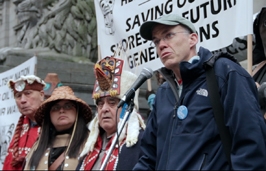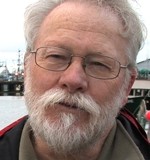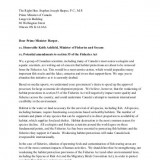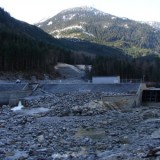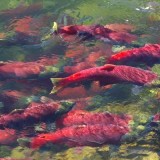About two weeks ago I was leaked a secret Harper Government document and released it to the public (March 12, 2012). I commented on the significance of that government’s attempted move to eliminate the habitat protection provisions in the Fisheries Act [i.e. section 35(1) – also called the HADD section of the Act – “harmful alteration , disruption or destruction of fish habitat]. The government was to sneak those amendments through Parliament in the Budget Omnibus Bill and few Canadians would have been aware of what had happened.
Since MP Fin Donnelly ambushed the DFO Minister in the House of Commons, Mr. Ashfield had to admit what he was up to and is now trying to rationalize his actions. Based on new information and brief Ministerial statements we can now see what has motivated Ashfield and his government and it is less than convincing and actually a bizarre logic. It is obvious that his plans to neuter the habitat law in the Fisheries Act is definitely not in the public interest and will ensure the continued erosion of Canada’s wild fishery resources that have been in decline for many years.
During the past many days I have been contacted by hundreds of reporters and concerned citizens and those closely associated with the fishery and its essential habitat base. I have been forwarded information on the flooding of the Craven County (Saskatchewan) Jamboree campground (see below). It is indeed that issue that Minister Ashfield seems to depend on most to rationalize the need to eliminate habitat protection from the Fisheries Act. Apparently his actions are based on a flood event that some river experts say, based on probability, will happen once every 300 years.
A Saskatchewan fish and game organization noted that thousands of northern pike and walleye (valuable sports, First Nations and in some areas commercial fish and ecologically significant species in any prairie river) were stranded behind the dyke after river flooding. The obvious way of addressing such a major fish stranding problem would be by the breaching of the apparently poorly designed dyke ‘protecting’ a poorly located campground. The water and entrained fish would then naturally drain out of the Jamboree dyked campground and re- enter the Q’Appelle River and be safe and the campground would be drained.
This is a common sense solution and appears to have been suggested at the time. It is too bad that fish have to die because the Jamboree campground was located in a flood plain which would be an important and uncommon habitat type in an area that is dry and not rich in rivers. Also the building of such a dyke can be counter productive as has been learned in many river systems such as in this very Saskatchewan-Manitoba flood event in 2011 and in the Mississippi River system floods. The river needs to spread out during flood events and dykes block the natural functioning and value of a flood- plain and its floodplain habitat values.
If you do build such dykes you have to construct them in a way to get water out from out behind the dyke once the flood is over. If pumps had to be used, a fish salvage program could and should have been undertaken. This is not rocket science and is standard procedure! Once the dyke is breached to drain flood water, it would have been very logical to put in a drainage culvert and flap valve prior to filling in the breach and in future years the site would drain naturally in the event of another flood. Why would this not be treated as a learning opportunity for all involved versus a knee jerk response by Mr. Ashfield?
This fish stranding example as raised by Mr. Ashfield to rationalize why the habitat provisions of the Fisheries Act go too far in protecting fish habitat. He accused his own staff of declaring the campground fish habitat and obstructed the drainage of the campground. Why has Minister Ashfield declared war on his own staff? Instead should he not budget for their training, better select competent managers and audit their activities before he cuts them off at the knees?
This example makes no sense whatsoever and provides no basis for the Harper government to go off on a tangent and say the present habitat legislation is too powerful to do the necessary job of protecting fish habitat across Canada. Despite the bizarre assertions of Mr. Ashfield, I am certain no court in Canada would accept a campground as fish habitat.
What Mr. Ashfield does not seem to realize is that the example he waves about is not really a habitat problem! If his DFO staff were not muzzled by the Harper Government they could state what actually took place at this incident. The entrainment of fish behind the dyke that would be killed by conventional pumping is really covered by another section of the Act – i.e. Section 32 – No person shall destroy fish by any means other than fishing except as authorized by the Minister or by a regulation passed by the Governor in Council. Therefore why use this incident as an excuse to eliminate the habitat provision of the Fisheries Act?
Even if the Harper Government did get away with the elimination of the habitat provisions in the Act, the very amendment that Mr. Ashfield has proposed and was leaked to Canadians still would have prevented the pumping out of the water from behind the dyke. If his amendment was passed by Parliament, it would still be illegal to do any work or activity that would adversely affect fish of economic, cultural or ecological value. Also in this circumstance the Section 35(1) would not to be used to stop the pumping – it was a fish kill incident that DFO staff were preventing – not a destruction of habitat.
Mr. Ashfield, his advisers and senior staff must get their minds straight on what they are really trying to do and obtain a basic understanding of Canada’s habitat law and the need to protect fish and fish habitat as intended by Parliament in 1976. Mr. Ashfield again speculates that this is not the intent of that section of the Act. Again he is totally wrong. I was hired by DFO in 1969 to protect fish habitat and worked to get this section of legislation into Parliament in 1975. Mr. Ashfield was no where on the radar screen in 1975 so I do not understand how he is now an expert on what DFO staff and a public resource needed or what Parliament intended some 37years ago. Instead of criticizing his staff and attempting to raze the Fisheries Act for no good reason, should a Minister of Fisheries and Oceans not better support his staff and the true intent of the Fisheries Act?
Mr. Ashfield says there has to be balance between development and habitat protection. Where has be he been in the past 50 years? In the Fraser River Estuary (the ecosystem where habitat losses forced the creation of the Fisheries Act habitat protection section [Section 35] and the DFO National Habitat Policy in 1976 and 1986 respectively) about 90% of our Fraser Estuary marshes (essential habitat for fish) have been eliminated by agricultural and other land development. In Ontario 60% of all wetlands have been lost – 75% by agriculture. In BC’s Lower Fraser Valley 20% of all streams have been lost, 63% are endangered, 13% threatened and only 5% remain in a wild state! This is an ongoing pattern across Canada! Is retaining the last remnant key habitat as found in these steams and marshes asking too much – especially from a Fisheries Minister and his colleague the Environment Minister?
If Mr. Ashfield was going to neuter the Fisheries Act habitat law, should he not have made that known to the Cohen Commission which just completed hearings three months ago? Cohen was directed by Prime Minister Harper to do an in depth and lengthy judicial review of what is wrong with sockeye salmon runs in the Fraser River. He and Environment Canada did have several habitat and enforcement experts at the hearing but many were not credible and at no time did any of them indicate that the habitat law would be tampered with or eliminated. Should the government not now recall the Cohen Inquiry so they can tell the truth? Why would Mr. Ashfield make any knee jerk changes to the Fisheries Act before the Cohen Commission final report is released this summer?
One must question what drives the mentality of the Harper government as related to environment issues and especially the tactics and logic used by Minister Ashfield in this instance. What DFO staff did at that campground site seemed proper and should maybe be done again if the Jamboree Grounds owners do not install works to prevent this flood-caused fish stranding from occurring again. Certainly the amendment proposed by Ashfield would accomplish nothing other than to eliminate the use of the habitat law that is needed in thousands of other applications across Canada if future generations are to have healthy populations of fish for economic, cultural or for healthy ecosystem functioning.
I cannot believe that it is the Jamboree Campground or drainage ditches/streams on a few farms that is the issue that has motivated the attempted elimination of habitat from the Fisheries Act. It just a cover, smokescreen or just an excuse to deliver on an anti-environment ideology. Over the years I have heard many complaints from industrial lobby groups like the the BC Business Council and many other such lobby efforts related to the pipeline, oil and gas, electrical and other industries. Their primary goal is to get DFO and habitat protection and environment assessment processes off their backs. Harper and his Natural Resources Minster Oliver have often repeated that very mantra and are willing to undermine whatever legislation is necessary to keep industry and investors happy. It appears that our government and many industries have an agenda for a much faster exploitation of Canadian resources to export as much as possible in as little time as possible without any significant environmental hurdles to cross? Is that the type of sustainability that Mr. Ashfield says he adheres to?
If the habitat law is lost, a key environmental assessment trigger is probably eliminated in Canada and the public and First Nations will be cheated out of a more transparent and consultative approach to human activities that can harm fish and fish habitat. In addition this law trigger allows comprehensive environmental assessment studies related to much more than fish habitat. That is probably the real goal of the Harper government and their industrial lobby friends. One would be a fool to believe that it is just about some fish stranded in a country jamboree campground or in a farmer’s field by a natural flood event – i.e. it’s a red herring!
Many years ago I noted a passage by some author that said: “Business and government do not have an ethic for the environment or future generations.” Over the past few years this has become more and more apparent.
